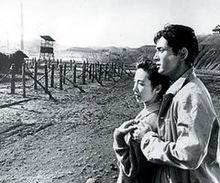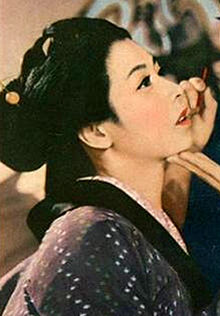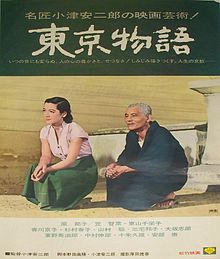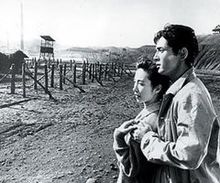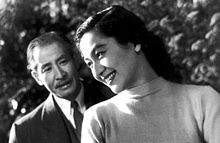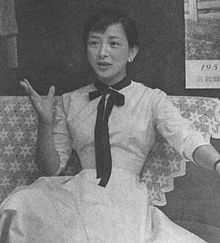The Human Condition (film series)
The Human Condition , Ningen no jken? is a Japanese epic film trilogy made between 1959 and 1961, based on the sixvolume novel published from 1956 to 1958 by Junpei Gomikawa. It was directed by Masaki Kobayashi and stars Tatsuya Nakadai. The trilogy follows the life of Kaji, a Japanese pacifist and socialist, as he tries to survive in the totalitarian and oppressive world of World War IIera Japan. Altogether, the trilogy ishours, 47 minutes long, not including intermissions, the longest fiction film ever made.
The first film, No Greater Love 1959 opens with Kaji marrying his sweetheart Michiko despite his misgivings about the future. The couple then move to a large mining operation in Japanesecolonized Manchuria where Kaji is a labor supervisor assigned to a workforce of Chinese prisoners. He tries and ultimately fails to reconcile his humanistic ideals with the brutal reality of forced labor in an imperial system. The movie ends with him being drafted to military service, in order for his superiors to do away with his disturbing presence at the Labor camp.In the second film, Road to Eternity 1959, Kaji, having lost his exemption from military service by protecting Chinese prisoners from unjust punishment, has now been conscripted into the Japanese Kwantung Army. Under suspicion of leftist sympathies, Kaji is assigned the toughest duties in his military recruiting class despite his excellent marksmanship and strong barracks discipline. His wife Michiko pleads for understanding in a letter to his commanding officer and later pays Kaji a highly unorthodox visit at his military facility to express her love and solidarity. Kaji considers escape across the front with his friend Shinjo, who is similarly under suspicion due to his brothers arrest for communist activities. Distrusting the idea that desertion will lead to freedom, and faithful to his wife, Kaji ultimately commits to continued military service despite his hardships. ........
Source: Wikipedia

